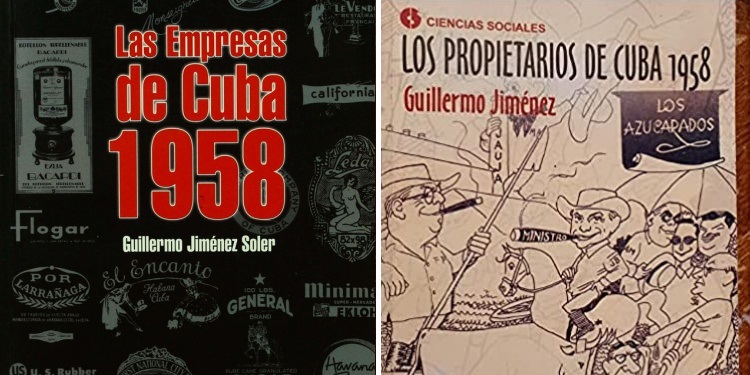Havana Cuba. – The Castro regime has always affirmed that before the triumph of the Revolution in 1959, the Cuban economy was in the hands of foreign capital, mainly from the United States. But two books published in Cuba by Editorial Ciencias Sociales, in 2004 and 2008 respectively, The companies of Cuba 1958 Y The owners of Cuba 1958authored by Guillermo Jiménez Soler, debunk this fallacy.
In The owners of Cuba 1958, the index “Foreign owners residing in Cuba” allows us to know that of the 550 owners that there were, 67 were Spanish, 28 Americans and 29 of other nationalities, which makes a total of 124. If we subtract this number from the total of 550, we will see that 426 owners were Cuban. The majority. The numbers speak for themselves.
Both books contain an excellent compilation of data with very complete files and that required a monumental investigation by Guillermo Jiménez Soler, a Law graduate from the University of Havana, who was a member of the Revolutionary Directorate of March 13, of the Communist Party, commander of the Army Rebelde, the Revolutionary Armed Forces and the Ministry of the Interior, and also held management positions in the Ministry of Foreign Affairs and the National Bank of Cuba.
In the prologue of The companies of Cuba 1958economist Oscar Zanetti called the book “a frankly unusual work.”
The author has explained that in both books it was proposed to preserve the investigation of “ideological prejudices”. Therefore, as the economist Jorge Ibarra points out in the prologue to The owners of Cuba 1958“here we will not find a pinch of teque”.
Companies in Cuba 1958 collects data from the 1,384 large companies existing in the country at the triumph of the Revolution.
Each file contains the official legal name of the entity, its economic activity, its owner, history and economic data.
The division by economic sectors and branches is: Agriculture and livestock (58), Banking (59), Commerce (324), Construction Materials (28), Contractors (57), Sugar Industry (135), Non-Sugar Industry (295) , Real Estate (53) Mines (37), Press and Advertising (53), Insurance (41), Services (28), Tobacco (46), Transportation (63), Tourism (78), Others (25). A broad subdivision encompassing 65 sections within the main groups.
Jiménez Soler, in the “Methodology of the Work”, indicates that “almost all of the small companies, which constituted the bulk of the existing ones, were excluded”.
In relation to the commerce sector, it states: “Retail food businesses (warehouses, butchers, fruit stalls, etc.) or gastronomic businesses (cafeterias, inns, etc.) and almost all commission agents were excluded, which only in the capital amounted to about 6,500 for the first two and 700 for the latter”.
In the rest of the country there were also multiple small businesses in different sectors. A conservative estimate may be between 25,000 and 30,000 establishments.
The book doesn’t say how many of these big companies are still in business, whether their products and services have grown, shrunk, or disappeared.
The owners in Cuba 1958 has a similar structure, with data on the 550 owners of these large businesses, broken down into: properties, positions and institutions to which they belonged, biography, family owners and other personal details and classified from one to five, according to the economic importance of their properties.
Considering this scale, what classification could we give today to the Castros, who, through the Business Administration Group (GAESA) that he chaired until his death a few days ago Luis Alberto Rodríguez López-Calleja, controls almost 80% of all profitable resources in the country?
The author omitted the foreign subsidiaries that operated in Cuba, paid taxes to our treasury or operated in coordination with nationally owned companies, which made the Cuban economy one of the strongest in Latin America.
Guillermo Jiménez Soler proposed the books “The bourgeoisie in Cuba” and “Capitalism in Cuba”, but to date they have not been published.
OPINION ARTICLE
The opinions expressed in this article are the sole responsibility of the issuer and do not necessarily represent the opinion of CubaNet.
Receive information from CubaNet on your cell phone through WhatsApp. Send us a message with the word “CUBA” on the phone +1 (786) 316-2072, You can also subscribe to our electronic newsletter by giving click here.






